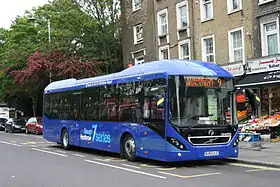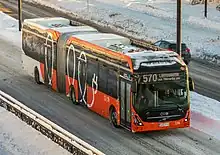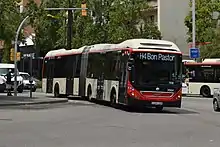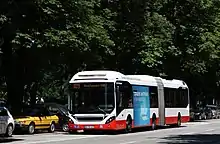Volvo 7900
The Volvo 7900 is an integrally-constructed single-decker rigid bus and single-decker articulated bus, most commonly available as a hybrid electric bus named Volvo 7900 Hybrid or just Volvo 7900H, but is also available with both diesel and Compressed Natural Gas (CNG) engines in some markets. It is manufactured at Volvo's plant in Poland. It was introduced at Busworld Kortrijk 2011.[1] Based on the Volvo 7900 Hybrid an extension is offered, which i.a. includes a roof-mounted device for occasional loading at stops. The manufacturer assumes that all buses at all end stations and also at some particularly busy stations stay a few minutes until the return or onward journey. As soon as a bus reaches an appropriately equipped stop, a loading unit attached to a pillar at the roadside lowers onto the coupling point mounted on the roof of the bus. The charging process ends as soon as the bus wants to continue or the battery is full. According to the manufacturer, this equipment allows (in addition to the brake energy recuperation) compared to conventional hybrid buses significantly extending the travel time in electric mode and a reduction in fuel consumption. The vehicle and the charging system were first presented to the public in September 2014 at the International Motor Show.
| Volvo 7900 | |
|---|---|
 First Berkshire & The Thames Valley on Kensington High Street in May 2014 | |
| Overview | |
| Manufacturer | Volvo |
| Production | 2011–present |
| Assembly | Wrocław, Poland |
| Body and chassis | |
| Class | Complete bus |
| Body style | Single-decker rigid bus Single-decker articulated bus |
| Doors | 1, 2, 3 or 4 |
| Floor type | Low floor |
| Chassis | Volvo B5LH, Volvo B9L, Volvo B9LA |
| Powertrain | |
| Engine | Volvo D5F, D5K, D9B, G9B |
| Capacity | 40 to 68 seated |
| Transmission | Volvo I-Shift 12 speed |
| Dimensions | |
| Length | 10.6, 12.0, 18.0 metres |
| Width | 2.55 metres |
| Height | 3.04 metres |
| Chronology | |
| Predecessor | Volvo 7700 |
In 2013, a tri-axle articulated hybrid electric was introduced as the Volvo 7900A Hybrid.[2] It replaced diesel and CNG versions of articulated 7900, due to upcoming discontinuation of B9L chassis without diesel- and CNG-powered non-hybrid replacements in European markets. The same also applied to solo 7900.
In September 2014, an electric plug-in hybrid version was unveiled, marketed as Volvo 7900 Electric Hybrid.[3][4] Three prototypes were operated in Gothenburg with pre-production examples to be trialled in Hamburg, Luxembourg and Stockholm.[5] Production is set to commence in 2016.[6]
In June 2015, an all-electric version, the Volvo 7900 Electric (sometimes named Volvo 7900e), premiered when three prototype buses entered service in Gothenburg. Series production began in 2017.[7][8] In September 2017, a Volvo 7900 Electric demonstrator vehicle (LF67 EVV) entered service with First Greater Manchester. The Harrogate Bus Company subsequently placed the first firm order for the 7900 Electric, with eight examples due to enter service in 2018.[9] An articulated version was launched in mainland Europe at Busworld 2019.[10] Electric versions use modified version of B5LH chassis, designated as Volvo BE, which utilises electric powertrain developed by Volvo. As a separate chassis for third-party bodybuilders, it was first launched in Australia with order announcement for Public Transport Authority in Western Australia in July 2020.[11] These buses will be bodied by Volgren. Volvo BE chassis became known as Volvo BZL in September 2021.[12] Simultaneously, Volvo removed plug-in hybrid bus model (7900 Electric Hybrid) from product offer.
On 14 April 2020, Volvo announced the S-Charge self-charging hybrid versions of 7900 and 7900A, which replaced original hybrid versions of these models.[13] It can run in electric mode at the speeds up to 50 km/h, up from 20 km/h in previous hybrid model. Previous model continued to be available in certain markets, such as the UK and Germany (was replaced in latter). Upgrades of hybrid models were first announced in October 2019.[14] Upgrades were also made for B5LH chassis.
The model is marketed in Germany as Volvo 7900 H/HA for hybrid versions, Volvo 7900 EH for plug-in hybrid version and Volvo 7900 E for electric versions. Additionally, in selected countries, the names "Hybrid", "Electric Hybrid" and "Electric" are translated to its official languages.

Operators


In Norway, Boreal Transport have operated one hybrid bus in Stavanger since 2012. In July 2013, Nettbuss took delivery of six diesels for Kongsberg and in October 2013, 17 hybrid buses for Oslo.[15][16][17] In July 2014, Nettbuss received 27 further hybrids for use in Drammen. Summer 2019 Tide Buss took delivery of 21 Electric models for use in the Trondheim area.
In the United Kingdom, where the hybrid version and Electric options are available, Lothian Buses operate a fleet of fifty and Stagecoach West Scotland have a fleet of 6 which entered service in 2021.[18][19][20]
In Hungary, Volánbusz of Budapest operated 89 articulated 7900s.[21][22]
In Estonia, "Tallinna Linnatranspordi AS" (Tallinn City Transport Inc.) of Tallinn operate a fleet of 44 7900 Hybrid since December 2015.[23]
In Lithuania, "Vilniaus viešasis transportas" operated two buses in Vilnius in June 2017 and September 2019, as part of a trial to test buses by different manufacturers.[24][25]
Belgium :
-In Brussels STIB operate, as part of a test, from 31 July 2017 to mid-September 2017 one 7900 Hybrid on route 64.[26] Since 30 October 2017, the STIB operate one 7900 A Hybrid on route 66.[27] 110 Volvo 7900 Hybrid were delivered between 2018 and 2019 and numbered 9401–9505.[28] In May 2020 the STIB ordered another batch of 128 Volvo 7900 Hybrid, these buses will replace the oldest VanHool NewA330 from 2007 (fleet number 8101 to 8227).[29][30][31]
-In Namur SRWT operate 11 Volvo 7900 Electric Hybrid since early 2017.[32] The fleet number of the buses in Namur is 4960 to 4970.
-In Charleroi SRWT operate 55 Volvo 7900 Electric Hybrid since 11 December 2017.[33][34][35][36] The fleet number of the buses is 7901 to 7955.

In December 2014, the transport company Hamburger Hochbahn put the first buses of this type into operation on the Innovation Line 109.
References
- Ny hybridbuss från Volvo Bussmagasinet.se 29 August 2011
- Volvo to introduce hybrid articulated buses Volvo 23 April 2013
- Volvo 7900 Electric Hybrid Coming Clean Technica 29 August 2014
- Volvo introduces completely new electric hybrid one: The Volvo 7900 Hybrid Electric Volvo Germany 19 September 2014
- Volvo to launch noiseless electric buses in Gothernburg Coach & Bus Week issue 1093 26 June 2013
- "Volvo ready to build 'plug in' hybrids" Buses issue 715 October 2014 page 16
- Electric bus route 55 launched in Gothenburg, Sweden Volvo Buses 15 June 2015
- Volvo’s first electric bus now on the roads of Gothenburg Volvo Buses 7 May 2015
- "Harrogate Bus Company (UK) Orders 8 All-Electric Volvo Buses". 7 February 2017.
- Volvo Buses launches new electric articulated bus – world premiere at Busworld
- Volvo Buses announces its first Electric Buses into Australia
- Volvo Buses launches new global electromobility offer
- Volvo’s new self-charging bus can now drive longer | Volvo Buses
- Volvo upgrades its full-hybrid buses – they can now drive longer and emission-free on electricity
- Nettbuss in Oslo, Norway buys 17 hybrid buses from Volvo Buses Automotive World 7 October 2013
- Nettbuss buys 17 Volvo hybrid buses Bus & Truck 13 October 2013
- Hybrid expansion at Nettbuss Bus & Coach Professional 23 October 2013
- New buses hitting the streets of Edinburgh Lothian Buses 21 July 2014
- More hybrid buses for the Heathrow 7-series network FirstGroup 5 February 2014
- Low carbon buses part-funded through the Green Bus fund UK Government
- Bohus, Dávid (6 April 2018). "Hibridek a végeken" (in Hungarian). iho.hu. Retrieved 15 April 2018.
- "Hungary, Volánbusz Zrt., Volvo 7900A". Vehicles List. Fotobus. Retrieved 15 April 2018.
- "24 Volvo hübriidbussi alustavad Tallinna linnas tööd" (in Estonian). autoleht.ee. 16 December 2015. Retrieved 6 November 2016.
- "Vilniaus miesto savivaldybė - Vilniaus gatvėmis riedės hibridinis "Volvo" autobusas". Vilniaus miesto savivaldybė (in Lithuanian). Retrieved 5 June 2017.
- "Lithuania, Volvo 7900 Hybrid — Vehicles List". fotobus.msk.ru. Retrieved 19 February 2021.
- "Bus Volvo 7900 hybrid on STIB's route 64 in Brussels". Retrieved 8 August 2017.
- "Bus Volvo 7900A hybrid on STIB's route 66 in Brussels". Retrieved 1 November 2017.
- "MIVB 9401-9510 : Volvo 9700 Hybrid | Hercules | Zone 01". www.zone01.be. Retrieved 26 May 2020.
- "128 Volvo hybride bussen voor de MIVB | Nieuws | Zone 01". www.zone01.be. Retrieved 26 May 2020.
- https://www.facebook.com/search/top/?q=volvo%20bus%20belgium&epa=SEARCH_BOX
- "Volvo dostarczy 128 hybrydowych autobusów do Brukseli".
- "Bus Volvo 7900 Hybrid TEC in Namur - photo 913". www.lesrails.com. Retrieved 8 August 2017.
- "Depuis ce lundi, des bus hybrides TEC roulent à Charleroi".
- "Charleroi accueille en ville ses premiers bus hybrides des TEC". 11 December 2017.
- "Charleroi: Les bus hybrides rouleront dès lundi sur le réseau". 4 December 2017.
- "Info : Sur Auvio".
External links
- 7900 Specifications Volvo Buses
- 7900 Articulated Specifications Volvo Buses